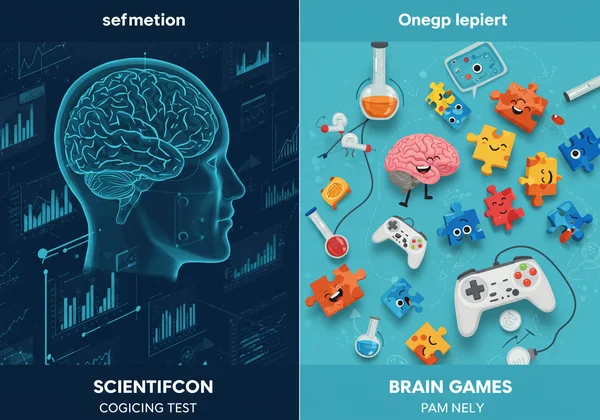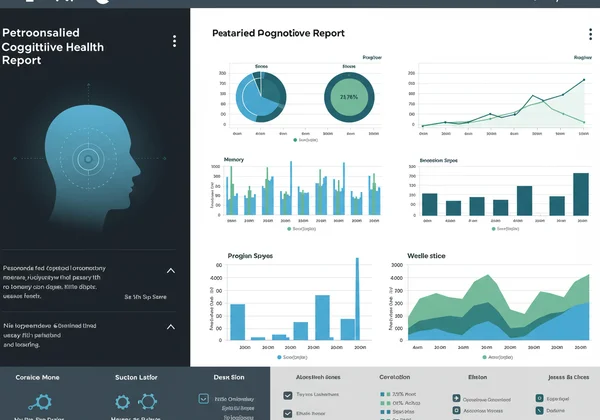Scientific Cognitive Test vs. Brain Games: The Real Difference
July 21, 2025 | By Audrey Fletcher
Are you looking to sharpen your mind or understand your brain health better? Many turn to popular brain games, but how do they compare to a scientific cognitive test? This is a critical question for anyone serious about their cognitive well-being. While both can be engaging, they serve fundamentally different purposes. This article will provide a clear, professional comparison between casual brain training and a scientifically validated cognitive test, helping you make an informed choice for your mental health.
Understanding Scientific Cognitive Tests and Assessments
Before we can compare, we must first define what a genuine cognitive assessment entails. It's far more than a simple puzzle or memory game. A scientific cognitive test is a standardized tool designed to systematically measure and evaluate various aspects of your cognitive abilities. Think of it less like a game and more like a comprehensive check-up for your brain's performance.
What is a Scientific Cognitive Test?
At its core, a scientific cognitive test is an objective evaluation of mental processes. These tests are developed by neuropsychologists and data scientists to provide reliable and valid data. They are built on established psychological principles to measure specific cognitive domains such as memory, attention, reasoning, and processing speed. The goal isn't to entertain but to generate accurate insights into your cognitive function.

What Does a Comprehensive Cognitive Test Consist Of?
A key differentiator is comprehensiveness. While a brain game might target one specific skill, a robust cognitive assessment test provides a holistic view. For instance, our comprehensive assessment evaluates 22 distinct cognitive skills. This multi-faceted approach ensures that you receive a complete profile of your cognitive strengths and weaknesses, rather than a narrow snapshot from a single activity. This depth is crucial for identifying subtle changes or understanding the complex interplay between different mental functions.
The Foundation of Scientific Rigor: Neuropsychology & Data
The trustworthiness of a cognitive test comes from its scientific foundation. Leading platforms build their assessments on established, peer-reviewed neuropsychological research, such as principles from the CogniFit Cognitive Assessment (CAB)® and the Woodcock-Johnson Tests of Cognitive Abilities (WJIV COG). This scientific rigor ensures that the tasks you perform are proven to measure the intended cognitive skills accurately. The result is data you can trust, whether for personal monitoring or for discussions with a healthcare professional.
Exploring Brain Training Games: What Are They For?
Now, let's turn our attention to brain training games. These apps and websites have exploded in popularity, promising to make you smarter, faster, and more focused through daily challenges. They are often fun, accessible, and create a sense of accomplishment. However, it's crucial to look beyond the marketing and evaluate their true utility.
What Are Casual Brain Games, Really?
Primarily, casual brain games are designed for entertainment. They use principles of gamification—points, levels, and rewards—to keep you engaged. While they do require you to use certain cognitive skills, like memory or reaction time, they are not standardized measurement tools. Their main purpose is to provide a stimulating diversion, not a clinical or scientific assessment of your cognitive health.

Common Misconceptions About Brain Training Effectiveness
One of the biggest misconceptions surrounds brain training validity. While research shows that practicing a specific game will make you better at that game, there is limited evidence that these skills transfer to broader, real-world cognitive abilities. Becoming an expert at a digital pattern-matching game doesn't necessarily improve your ability to remember your grocery list or follow a complex conversation. A scientific test, in contrast, is designed to measure foundational skills that directly impact daily life.
Key Differences: Rigor, Purpose, and Personal Insight
The distinction becomes crystal clear when we place a scientific assessment and a brain game side-by-side. The differences in their design, purpose, and the insights they provide are significant. Understanding these differences is crucial for anyone, from a proactive health monitor to a concerned family member seeking clarity.
Purpose and Design: Screening for Insights vs. Entertainment
The most fundamental difference is intent. A scientific cognitive test is a screening tool designed for insight. Its purpose is to give you a detailed, data-driven report on your brain's performance. In contrast, a brain game is an entertainment product designed for engagement. The design choices reflect this: a test uses carefully calibrated tasks, while a game uses fun mechanics.
Validation & Reliability: Evidence-Based vs. Anecdotal Claims
This is where the distinction is most critical. A true cognitive assessment is scientifically validated, meaning its reliability and accuracy have been tested and proven. The results are compared against large, age-specific normative datasets, providing a meaningful benchmark. Brain games rarely offer this level of validation. Their effectiveness is often based on anecdotal claims rather than rigorous, evidence-based data, making them unsuitable for reliable cognitive testing.

Personalized Insights vs. Generic Challenges
Perhaps the most valuable output from a scientific test is the personalized report. For example, our platform uses AI to analyze your performance across 22 cognitive skills and generate a comprehensive, easy-to-understand report. This AI-enhanced insight explains your cognitive profile, its implications for daily life, and actionable recommendations. Brain games typically provide only a generic score or level, lacking the personalized context and depth needed for true understanding.
Why Choose a Scientific Online Cognitive Assessment Like Ours?
If your goal is a fun distraction, brain games are a fine choice. But if your goal is to genuinely understand, monitor, or improve your cognitive health, a scientific assessment is the only credible option. The choice is between surface-level entertainment and deep, meaningful knowledge.
Beyond Games: Gaining True Cognitive Understanding
Moving beyond games allows you to gain a real understanding of your cognitive function. An online cognitive assessment provides a structured, evidence-based look at how your brain works. This information is invaluable for self-awareness, identifying potential areas of concern, and having more informed conversations with healthcare providers. It replaces guesswork with objective data. Why wonder about your memory when you can get your results from a scientifically designed tool?
Building Your Cognitive Baseline and Monitoring Health
One of the most powerful uses of a scientific test is establishing a cognitive baseline. By taking a comprehensive assessment, you create a benchmark of your current cognitive abilities. This allows you to monitor your brain health over time and detect any significant changes early on. For proactive individuals and concerned family members alike, this ability to track cognitive health is a game-changer, offering peace of mind and empowering early action. You can start your assessment today to create that vital baseline.

Making the Right Choice for Your Brain Health
Ultimately, while both scientific cognitive tests and brain games engage your mind, they serve fundamentally distinct purposes. Brain games offer entertainment and practice on specific tasks. A scientific cognitive test, however, provides a comprehensive, validated, and personalized assessment of your overall cognitive health.
For those serious about understanding their minds, monitoring their cognitive health, or gathering reliable data for medical discussions, the choice is clear. Opting for a scientifically rigorous platform is the most effective path to gaining genuine insight.
Ready to move beyond games and discover what a real assessment can reveal? Start your free assessment now.
Frequently Asked Questions About Cognitive Tests and Brain Games
How Our Scientific Cognitive Test Differs from Free Brain Games
The primary difference lies in scientific rigor and purpose. Our platform is a scientific cognitive test developed by neuropsychologists to comprehensively evaluate 22 cognitive skills. It provides a detailed, AI-enhanced report for deep insight. Free brain games are primarily for entertainment and lack the scientific validation, standardization, and comprehensive analysis required for a reliable cognitive assessment.
Can I take a scientific cognitive test online for free?
Yes. We believe high-quality cognitive assessment should be accessible. This platform offers a comprehensive and scientifically validated online cognitive test for free. You receive an immediate summary upon completion, with the option for a more detailed, AI-enhanced report to gain deeper insights into your cognitive profile.
Can you give yourself a cognitive test at home?
Absolutely. Modern platforms like ours are designed for easy, at-home use. The instructions are clear, and the interface is user-friendly for people of all ages and technical abilities. This allows you to complete a thorough cognitive function test in a comfortable and familiar environment, providing a convenient way to monitor your cognitive health.
What if my cognitive test results show areas for improvement?
Receiving results that highlight challenges can be empowering. It provides a clear, objective starting point for taking proactive steps. Our reports are designed to be positive and action-oriented, offering suggestions for cognitive health. The goal is not to cause anxiety but to provide you with the knowledge needed to support your brain health. Remember, this test is a screening tool, and any concerns should always be discussed with a qualified medical professional for a formal diagnosis or advice.